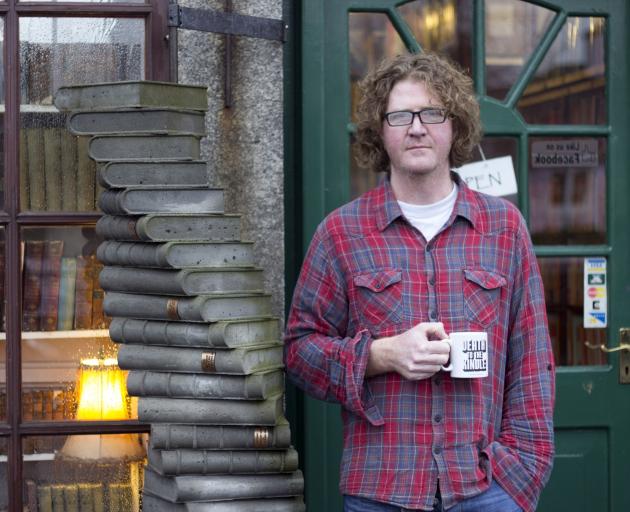
Shaun Bythell owns The Bookshop, Wigtown, Scotland’s largest second-hand bookshop. It contains 100,000 books, spread over a mile of shelving, with twisting corridors and roaring fires, and all set in a beautiful, rural town by the edge of the sea. A book-lover’s paradise? Well, almost ... In his wry and hilarious book, The Diary of a Bookseller, Shaun provides an inside look at the trials and tribulations of life in the book trade, from struggles with eccentric customers to wrangles with his own staff. He takes us with him on buying trips to old estates and auction houses, recommends books (both lost classics and new discoveries), introduces us to the thrill of the unexpected find, and evokes the rhythms and charms of small-town life, with a sharp and sympathetic eye.

For me, the decision to buy the shop was less about the appeal of being a bookseller, and more about not doing low-paid, unrewarding work for other people any more. I decided that if I was going to be doing low-paid, unrewarding work, it might as well be for myself. When I left university with a degree in law, I made a conscious choice that it wasn’t a career that I wished to pursue, and as a consequence I ended up doing lots of jobs I hated, construction labourer on gas pipelines, temping jobs, that sort of thing. I realised that with no desire for a career, and very little motivation, combined with a lack of respect for authority, I was singularly unsuited to the world of employment; all that remained was self-employment, so when the opportunity to buy the shop arose, I grabbed it. At the time I had no idea how lucky I was to end up in a business that I utterly adore, but now I realise that bookselling is something for which I have some aptitude, and which fulfils me enormously.
Q How would you describe your bookshop?
The shop is a rambling Georgian townhouse built in about 1830, although much of the building pre-dates that by several centuries. It is mainly on the ground floor, and I’ve tried to make it as interesting as possible, with nooks and crannies, old beaten-up leather armchairs by a roaring fire. Every year I try to add something to make people talk about the shop, so there’s a full-sized skeleton playing a violin hanging from the ceiling in one room, a model railway under the floor in another, and a mezzanine level with a bed on it in another. People who come in for the first time invariably end up coming to the counter saying ‘Wow, it’s much bigger than it looks from the front’ or describing it as an Aladdin’s cave. I’ve done a huge amount of work to the place over the past 17 years, and tried to restore as much of the Georgian character to the building as possible. I want it to have an impact on people who visit.
Q Why did you decide to write about your customers?
I’ve been writing about my customers on Facebook for years. When I started, I looked at what other bookshops were doing on the site and decided that it was all a bit woolly and insipid, so I decided to take a risk and be honest about what customers are really like. Within a few weeks I’d received dozens of messages from other booksellers telling me that they wished they could write the sorts of things I was writing, on their pages, so it occurred to me that there might be something in this. I try not to be cruel or judgmental, and merely describe what people do, leaving the reader to make their own judgement although I’m fully aware that in even choosing which behaviours to write about there’s an element of me being judgmental. Jen Campbell’s book Weird Things Customers Say in Bookshops came out in 2012, and I thought ‘That’s it. That’s the book I was going to write, and someone’s beaten me to it, so Jessica, my partner at the time encouraged me to start keeping a diary as an aide memoire, as reference for a possible book in the future, and inevitably it ended up being mainly about appalling customers.
Q What are the worst things people can do when they come into your shop?
The worst things people do are to ignore you when you say hello to them when they come in, treat you like a second-class citizen because you work in a shop, and demand a discount. To be honest, they never fail to amaze me with the creative ways in which they can annoy me. Every day brings at least one new one. I know I sound misanthropic, but really, I’m not. Most customers are polite, friendly and easy to deal with, but it’s the handful that aren’t that you remember. And, even friendliness can be annoying when it involves someone telling you something you’ve heard a thousand times. It’s hard to muster any enthusiasm for someone telling you ‘You’ve got a lot of books, haven’t you?’ It’s a bloody bookshop, what were you expecting?
Q Have you lost and gained customers over your book?
There has definitely been a net gain. Every day customers come to the counter with books and tell me that the reason they’re there is because they’ve read the book, and in cases where I thought people might have been offended by what I’ve written I changed minor details so that hopefully they don’t recognise themselves. And if they do, then tough — I hope that what I’ve done is to hold a mirror up to their behaviour, rather than set out to humiliate them. I don’t want to upset people, but when customers offend me, I see no reason why not to make their behaviour public. Before I wrote the book I would get upset by some of that behaviour, but now that I know there’s an appetite for reading about it, when someone says or does something truly awful, I’m utterly delighted because it gives me material to write about.
Q Can you tell us about the issue with the Orwell estate?
Ah, the Orwell estate. In 1936 George Orwell published an essay called ‘Bookshop Memories’, drawing on his experience as a bookseller in Booklover’s Corner in South End Road, Hampstead. It is a beautiful and typically observant piece of writing. I decided that, to show the similarities and differences in working in a second-hand bookshop 78 years after he’d written it, to preface each month of my diary with an extract from it. Unfortunately this proved to be in breach of copyright, as Orwell’s work remains within those exclusions until 2020, and the estate picked up on it. Fortunately they were pretty decent about it, and we reached a very reasonable settlement.
Q What’s your beef with Kindles/Amazon?
My beef with the Kindle is very different from my beef with Amazon. I am a huge fan of guerrilla marketing, so I decided to make a spoof YouTube tutorial about how to repair a Kindle with a damaged screen by shooting it with a 12-bore shotgun. I mounted it on a wooden shield as though it was an animal trophy and hung it in the shop. It is by far the most photographed thing in the shop. I don’t think the Kindle has had a huge impact on book sales, either new or used, but Amazon has and continues to have a devastating effect on the high street. I’m not so naive as to think that the tide of online selling can be turned back, but a level playing field would be nice. Try entering ‘Relentless.com’ into Google and see what comes up. It was the name Bezos registered for Amazon, and it reflects his approach to business. He wants it to be ‘the everything store’ and it is increasingly becoming that. What I resent is their tax arrangements. I read somewhere that in 2013 Amazon received more in grant funding from the Scottish Government than it paid in tax on its entire UK revenue. That cannot be equitable for such a monstrous company. I could go on, but I won’t.
Q How do you feel about your book being available on Amazon?
When I signed up with my publisher, I asked them if it would be possible to not make the book available on Amazon or the Kindle. They immediately said no, and that it would breach the terms of their contract with Amazon, so I asked if it could be withheld from Amazon for a month, to give independent book shops a small advantage. Again, they said it would be in breach of contract, and given how powerful Amazon is, how much publishers depend on it, and how punitive their contracts are, there was no way around it. If you want to know quite how unreasonable Amazon is, look at the dispute Hachette had with them over the pricing of their ebooks. Hachette wouldn’t play ball, so Amazon financially strangled Hachette by refusing to allow pre-orders of their titles on its site, and putting huge delays on the availability of Hachette titles, until they capitulated.
Q Your book has been very popular internationally and has even been translated into Icelandic. How would you explain the international interest/success/appeal of your book?
Honestly, I have no idea. When I was in Italy recently my Italian publisher told me that a struggling independent rural Scottish bookshop has a certain "romance" for Italian people. And I suppose it is fortunate for me that there’s an element of zeitgeist about it; people are noticing bookshops disappearing from their high streets, and I hope my book offers a small insight into why that is happening, and what can be done to reverse the trend.
Q How has it affected Wigtown?
I can’t speak for Wigtown, thankfully, everyone here has a voice of their own and thoughts of their own. I very much doubt whether anyone in Wigtown has even noticed that I’ve written a book, but I suppose the other bookshops, and the cafes and B&Bs might have had a few people mention that they’re here because they’ve read my book. Wigtown endures, mostly oblivious to the rest of the world. That’s why I love it.
Q What are you working on now?
I’ve written the second year, and continue to write every day. Even if nothing more comes of it, I’ve found a cathartic release for the pent-up fury of having to deal with infuriating customers. Profile, my publisher, will publish volume 2 next year, I think.
The talk
• Shaun Bythell talks about books, batty customers, and Kindle extermination, in conversation with Phillippa Duffy, Hutton Theatre, Otago Museum, Sunday, September 2, 2pm. The event is hosted by the Dunedin Writers and Readers Festival in association with WORD Christchurch. Tickets $20 from University Book Shop.
Tickets
• The Weekend Mix has a double pass to Shaun Bythell’s talk to give away. To go in the draw, email playtime@odt.co.nz with ‘‘Writers & Readers’’ in the subject line, and your name, address and contact phone number in the body of the email.











